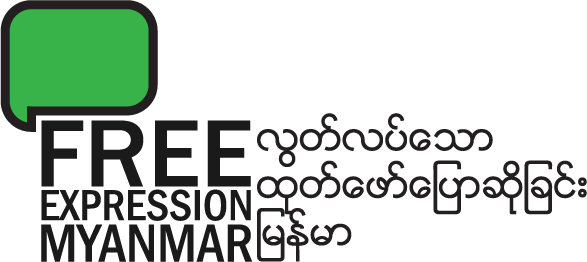About ကျွန်ုပ်တို့အကြောင်း
Free Expression Myanmar (FEM) was founded in May 2017 by a group of human rights defenders involved in the 66(d) coalition. The FEM team has years of experience working on freedom of expression and information in Myanmar.
FEM was created to fill a gap: although Myanmar had elected its first ever civilian government, local civil society lacked technical expertise to drive forward legal reform.
It was time for legal reform to be led by local civil society voices and their strategy.
This meant one thing – an organisation was needed that could produce high quality research – such as shadow Whitepapers, legal analyses, and case reports – and promote SMART recommendations through advocacy to the highest levels of the Myanmar government and influential stakeholders.
FEM's vision
FEM’s vision is a Myanmar where decision-makers, particularly the State, are influenced and accountable to the people most affected by their decisions.
All people would be free to seek ideas and information, receive them without hindrance, and express their own ideas and information without fear.
Greater accountability would result in less corruption and wrongdoing. More inclusive and well-considered decision-making would result in more effective and efficient government and stronger development for all.
FEM's mission
FEM contributes to this vision by defending the right to freedom of expression and information in Myanmar (FoEI).
FEM's desired outcomes
FEM achieves its mission by delivering its desired outcomes:
- To increase knowledge on FoEI among decision-makers. FEM does this by publishing and training on high quality research and policy recommendations based on international standards
- To shift attitudes on FoEI among decision-makers. FEM does this by delivering conferences,trainings, workshops, roundtables to decision-makers, usually after building civil society partnerships to maximise influence.
- To encourage progressive behaviour on FoEI among decision-makers. FEM does this by conducting high-level advocacy with decision-makers, including on individuals' cases
FEM’s approach
In all its work, FEM:
- Represents, works directly with, and includes beneficiaries, prioritising those discriminated against and excluded, particularly women
- Collaborates with a range of government and non-government partners, building influential networks and coalitions
- Localises international standards - translating them into Myanmar context to make them more understandable and practical.
FEM’s status
FEM has a Constitution, a Committee, and is based in Yangon, Myanmar. FEM is in the process of trying to register under the Association Law, but the law includes many hurdles and freedom of expression is a very sensitive subject in Myanmar.
FEM is:
- Non-profit
- non-commercial
- non-government
- non-politically partisan
- independent from government, business and other organisations
- and subscribes to universal human rights.
FEM’s team
The FEM team is a group of Myanmar and international human rights defenders. We have decades of experience working on freedom of expression in Myanmar. We have worked on:
- Freedom of expression training
- High level advocacy with the government
- Networking with civil society
- International standards
- Media laws
- Gender, LGBT and other minorities
- Digital rights
- Hate speech and incitement laws
- Protest and assembly
- UN, UN Human Rights Council, UN Special Rapporteurs, UNESCO
We do not publish the names of those persons involved in FEM for security reasons.
Partnering with FEM
FEM works with many partners on different issues. We choose our partners if our strategic objectives match. FEM partners have included civil society, NGOs, government departments, MPs, IGOs (like UNESCO), donors and foreign governments. Some of our partnership work has included:
- Project management
- Coordinated advocacy and campaigning
- Researching and publishing (professional research based on tested methodologies)
- Training and workshops on any freedom of expression issue (such as media laws, protest, digital rights, hate speech, right to information, gender, etc.)
- Training and workshops on international standards, international law, and international mechanisms
FEM can work in full project partnership, activity partnership, or on a consultancy basis.
လွတ်လပ်သောပြောဆိုခြင်း မြန်မာ သည် မြန်မာနိုင်ငံတွင် လွတ်လပ်စွာရေးသားပြောဆိုခြင်းကို အဟန့်အတားဖြစ်စေသည့် ဆက်သွယ်ရေးဥပဒေ နှင့် နာမည်ဆိုးဖြင့် ကျော်ကြားနေသည့် ပုဒ်မ ၆၆-ဃ ကိုဖျက်သိမ်းရန် ကြိုးစားနေကြသော အရပ်ဖက်အဖွဲ့အစည်းများတွင် တက်ကြွစွာပါဝင်လှုပ်ရှားနေကြသည့် လူ့အခွင့်အရေးလှုပ်ရှားသူများက ပူးပေါင်း၍ မေ ၂၀၁၇ တွင် စတင်တည်ထောင်ခဲ့ကြခြင်းဖြစ်သည်။
FEM ကို ယခုမှစတင်တည်ထောင်ခဲ့သော်လည်း ပါဝင်သူများသည် မြန်မာနိုင်ငံတွင်းလွတ်လပ်စွာဖော်ထုတ်ပြောဆိုရေးသားခြင်း ၊ သတင်းအချက်အလက်လွတ်လပ်ခွင့်များအတွက် နှစ်ပေါင်းများစွာ အတွေ့အကြုံရှိခဲ့သူများဖြစ်သည်။
ကျွန်ုပ်တို့ သည် မြန်မာနိုင်ငံတွင် လွတ်လပ်စွာထုတ်ဖော်ပြောဆိုရေးသားခြင်းနှင့် သတင်းအချက်အလက်လွတ်လပ်ခွင့်နှင့် ဆက်စပ်နေသော ဥပဒေပြင်ဆင်ရေး ၊ လူ့အခွင့်အရေးချိုးဖောက်ခံရသူများကို အကာအကွယ်ပြုရေး နှင့် နိုင်ငံတကာအလေ့အထကောင်းများကို အလေးဂရုပြုလာအောင် လုပ်ဆောင်ပေးနိုင်သည့် လူ့အခွင့်အရေးလှုပ်ရှားသူများ ၊ အဖွဲ့အစည်းများ နည်းပါးနေသေးသည်ကို သတိပြုမိခဲ့ကြသည်။
FEM သည်
- အကျိုးအမြတ်မရှာသော
- အကျိုးစီးပွားမလုပ်သော
- အစိုးရမဟုတ်သော
- ပါတီနိုင်ငံရေးမလုပ်သော
- အစိုးရ ၊ စီးပွားရေးလုပ်ငန်းများ နှင့် အခြားသော အဖွဲ့အစည်းများ၏ လွှမ်းမိုးမှုမှ ကင်းလွတ်သည့် လွတ်လပ်သော လူသားတို့၏ အခွင့်အရေးကိုသာ ရှေးရှုသည့်အဖွဲ့အစည်းဖြစ်သည်။
FEM ၏ရည်ရွယ်ချက်
FEM ၏ ရည်ရွယ်ချက်သည် လွတ်လပ်စွာထုတ်ဖော်ပြောဆိုရေးသားခွင့် နှင့် သတင်းအချက်အလက်လွတ်လပ်ခွင့်ကို ကာကွယ်ရန်ဖြစ်သည်။
FEM သည်
- မူဝါဒများကို သုတေသနပြုခြင်း ၊ ချမှတ်ပေးခြင်း၊
- လူ့အခွင့်အအရေးချိုးဖောက်ခံရသည့် တစ်ဦးချင်းကိစ္စရပ်များအပါအဝင် လှုပ်ရှားမှုများ ၊ စည်းရုံးမှုများ လုပ်ဆောင်ခြင်း၊
- အလုပ်ရုံဆွေးနွေးပွဲများနှင့် သင်တန်းများပို့ချခြင်း တို့ကို ပြုလုပ်သည်။
FEM ၏ တရားဝင်ရပ်တည်မှု အခြေအနေ
FEM တွင် စနစ်တကျရေးဆွဲထားသည့် ဖွဲ့စည်းပုံစည်းမျဉ်း ၊ ကော်မတီ တို့ဖြင့် ဖွဲ့စည်းထားပြီး ရန်ကုန်မြို့တွင် အခြေစိုက်ပါသည်။ အသင်းအဖွဲ့စည်းမျဉ်းအက်ဥပဒေဖြင့် တရားဝင် မှတ်ပုံတင်ရန် ကြိုးစားနေပါသည်။ သို့သော် ဥပဒေတွင် လစ်ဟာချက်များရှိနေပြီး လွတ်လပ်စွာထုတ်ဖော်ပြောဆိုရေးသားခြင်းဆိုသည်မှာ မြန်မာနိုင်ငံတွင် ထိရှလွယ်သော နယ်ပယ်တစ်ခုဖြစ်နေပါသေးသည်။
